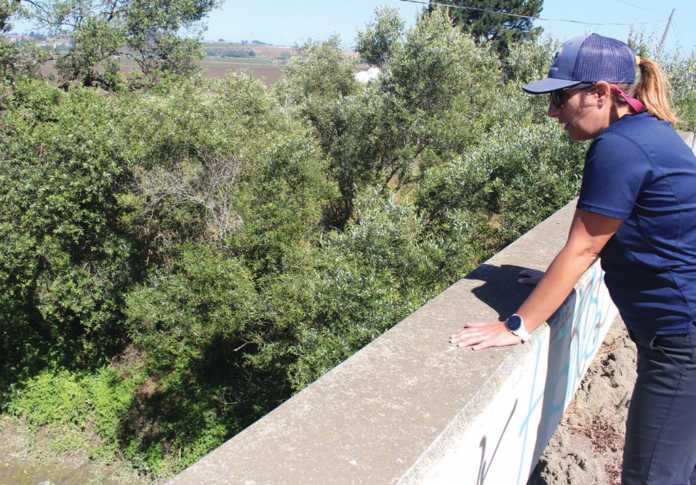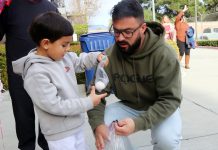Editor’s note: This is the second of a two-part series on illegal dumping in the Pajaro Valley. Read the first part in the Aug. 23 edition of the Pajaronian.
WATSONVILLE — For the City of Watsonville’s Sr. Utilities Engineer Jacqueline McCloud, nothing is more heartbreaking than seeing a waterway that she manages clogged full of trash.
Even mere steps from her office at the Water Resources Center, just off West Beach Street along a bend of the Pajaro River, she has seen plenty.
“I feel this kind of deep-set sorrow when I see human waste in a natural environment,” McCloud said. “I’ve actually seen animals building nests from garbage. It’s disgusting.”
A new regulation in California is calling for 100 percent of trash to be removed from rivers, sloughs and other inland bodies of water by 2030. New ordinances would require things such as trash ‘racks’ being placed on the end of waterways to catch garbage before it flows into major channels.
But illegal dumping, McCloud said, is a systemic issue—and one that requires a change of behavior more than anything.
“As an agency, we just can’t control whether someone decides to come out here and dump their old stove,” she said.
McCloud said that in her five years working within the city’s Stormwater Management department, she has seen about a 20 percent growth in illegal dumping—especially along riverbanks and in sloughs.
“I have definitely seen an increase,” she said. “We don’t really know what’s going on. Even the road to get here—they’ll put junk right outside our boundary line. It seems like people are just getting more comfortable doing it.”

A stripped computer tower lies along the bank of the Pajaro River. Such items contain silicon, metals and other chemicals that can be released into the environment. — Johanna Miller/The Pajaronian
The impact of illegal dumping crosses various social and economical issues. McCloud’s focus, however, is on the environmental impacts. Man-made objects often contain harmful chemicals and toxins which can seep into the soil and contaminate habitats, she said.
“When we think of garbage, the biggest thing we worry about is the breakdown of it,” she explained.
Car batteries are a big culprit. McCloud has seen them be ripped apart to be repurposed and then dumped on the riverbank. These batteries contain hydrochloric acid, which is toxic to plant and animal life, she said.
Metals at low concentrations can be toxic to fish and amphibians. Tires often contain levels of zinc. Plastics are often ingested by wildlife. Computer parts are made with silicon, metals and other chemicals.
McCloud said she recently saw a refrigerator on the side of the road near the river. Most older refrigerators models used Freon as a coolant—which has been linked to ozone layer depletion.
The Pajaro River is home to countless species of fish, birds and other wildlife. It is a vital habitat of the newly revived Steelhead Trout; according to the National Marine Fisheries it is a “priority river” for the creature’s migration.
“That in itself makes us bound to keeping this river clean,” McCloud said.
And it’s not just wildlife—humans are at risk from illegal dumping as well, she added.
“You might think it’s not a big deal to leave a bag of dirty diapers by the side of the road, but we are mandated by the EPA not to expose fecal coliforms to the environment,” McCloud said. “[Fecal coliforms] are warm-blooded pathogens that can make people really sick. So if that’s flushing into the rivers, and out to the ocean… now you’ve got a public health risk.”
The City of Watsonville, along with the County of Santa Cruz has organized cleanups through Save Our Shores where people came out with paddleboards and kayaks, dislodging everything from car tires to glass bottles from the muck. And Coastal Cleanup Day remains an annual event.
But those cleanups are a last-ditch effort in resolving a much bigger issue, McCloud said.
“We need to stop this stuff from getting there in the first place,” she said. “We pull an insane amount of garbage from the river every year, but it just keeps coming back.”

Trash and an old cooler is littered alongside an agriculture field near the Pajaro River. — Johanna Miller/The Pajaronian
Education is imperative to curbing the issue of illegal dumping—and the city is continually trying to expand its outreach programs.
“It’s about getting the information out there,” said Assistant Public Works Director Michelle Templeton, “and changing people’s behavior. Research shows that if people see a place already dirty, they’re more likely to just add to it.”
The city works with regional agencies to produce advertisements and public service announcements about illegal dumping, but not everyone responds to that, Templeton admitted.
“Peer pressure—from your friends or family, is a much more real thing,” she said. “We need to normalize that this is not OK.”
Both McCloud and Templeton said they understand that cost is a factor for South County residents.
“Watsonville is a low-income community,” McCloud said. “Our per capita is about $17,000. Is this truly the barrier? If so, we have work to do on that end.”
Added McCloud: “People may worry that the drop-off centers are costly. But so much can be dropped off for free or barely anything. And illegal dumping is still a cost—it costs the city money every time we have to clean it up.”
McCloud said she has faith that things will get better.
“Progress takes a lot of time,” she said. “It might not be in my lifetime… but we’re putting the building blocks in place. We are trying to keep this land safe, clean and enjoyable for future generations.”
•••
Drop off solid waste at The Municipal Services Center, 320 Harvest Dr., Watsonville, Monday-Saturday, 9 a.m.-3:30 p.m. For information and to report illegal dumping in your area call 768-3133.










